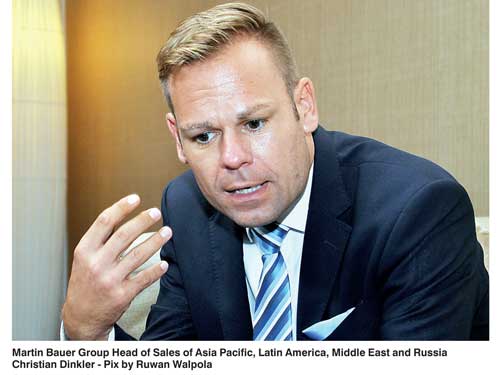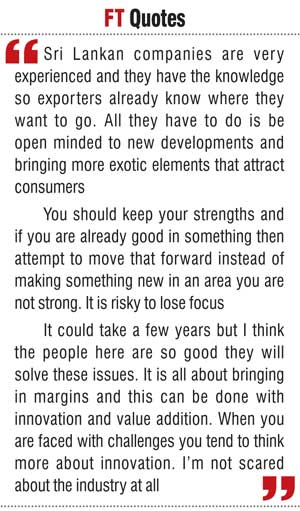Tuesday Feb 17, 2026
Tuesday Feb 17, 2026
Friday, 18 November 2016 00:00 - - {{hitsCtrl.values.hits}}
Martin Bauer Group Head of Sales of Asia Pacific, Latin America, Middle East and Russia Christian Dinkler was upbeat on the resilience of Ceylon Tea and the perseverance of the industry to battleon
in challenging times. Dinkler was in Sri Lanka recently as a Guest Speaker at the Tea Exporters’ Association Annual General Meeting. Excerpts of his interview with Daily FT are given below:
By Uditha Jayasinghe
Q: Could you please recap your key message to tea exporters?
A: Nowadays you have to differentiate. It’s all about finding some new ideas, trends to bring value to your product and you get more space in the market. When it comes to black tea producing countries it is sometimes difficult for them to find the right direction for increasing their sales and possibilities and this is where we can bring in some value to help them understand that they can make much more out of their beautiful tea.
Q: Sri Lanka still exports large amounts of bulk tea so what would your recommendations be to the industry at large?
A: Tea plus. Tea plus just means enhancing the beautiful tea with new items, and making them special. So it all starts with plain black teas and the question is how you can make the range wider with this product. So tea plus just means adding something, making new flavours, adding fruits and flowers to enhance the beauty of the tea. If you have black tea containing rose petals or marigold flowers, it is just to attract people. It has to do with premiumisation, which is a common trend at the moment, and when you have flavoured tea the consumer is attracted to the idea of the product. Adding fruit pieces, for example, is just showing that this is a premium product and I am a premium producer because I add the fruit itself. Legislation in some countries is very particular about this; you cannot put a picture of a strawberry on the box without having actual strawberry pieces in the tea. So this is just adding premium to your products and it really helps in the sales and marketing activities. The tea bag is still the highest category in this area and we have always noticed that the best-looking products are also the most popular.

Q: Could value addition of this nature be challenging for companies from a developing country?
A: I would not say so because especially in Sri Lanka you have a big advantage. Sri Lanka is extremely experienced in tea and all of these companies know how to deal with machinery, marketing and everything else. As for development work, that could be done by companies like ours because we offer the service for free. So we develop the products and for them it is just adding it to the black tea and packing it. From a technology perspective, our company also takes care of the machinery and we customise all components of a product exactly to the requirements of each customer. So what we need is just an exact brief of what they want and we would develop it. They (companies) should not have any problems in their regular life.
Q: How much tea do your source from Sri Lanka?
A: We source quite a lot for our customers in Europe and US, but we don’t like to divulge quantities. Ceylon black tea, in my view, is among the best in the world so it is always a good option to have it in the range of teas marketed. But mainly when we sell it to other customers around the world it is almost always enhanced with fruits or herbs.
Q: Tea exporters are lobbying for a tea hub in Sri Lanka for blending and re-export. Do you see this as an essential need for the industry going forward?
A: These issues can always be tackled from different perspectives. I think I can understand all sides a little bit and this is clearly something that needs to be sorted out within Sri Lanka. From an outside perspective it is very difficult to give a recommendation. This depends on the overall business model of every individual company. If you would like to go mainstream, then it makes sense because Ceylon Tea is one of the high priced teas, and if you prefer to blend then that also gives you possibilities. Both could reduce costing and increase profits. You can also approach it from a different perspective where you try to differentiate your product by adding flowers, herbs or fruits and making new varieties that can also boost sales, which would also allow you to remain with your local teas. It’s really difficult to give a recommendation. The fact is you have to see the whole structure in Sri Lanka and the social aspects before deciding but coming together in one direction certainly gives the industry more power, which I think is important.
Q: It has been recommended that Sri Lanka should target developed countries, particularly Millennials. Would you concur with this view?
A: There are many possibilities. There are emerging markets and developed markets. In the latter it is more difficult because the competition already exists and it’s hard to get in. Upcoming markets are more interesting because the competition is just starting and if you are one of the first then you have a good chance. In the Middle East I think countries like Iran could become interesting and Sri Lanka can find a niche there. Sri Lanka has many options because of its premium product. For me I think China would be very interesting because Chinese people are used to spending high amounts of money on their own green tea and especially with such a good reputation Ceylon Tea should have a chance. In the developed markets Ceylon Tea is already well known but competition means it would be hard to grow fast. Sri Lankan companies are very experienced and they have the knowledge so exporters already know where they want to go. All they have to do is be open-minded to new developments and bringing more exotic elements that attract consumers.
Q: Would you recommend Sri Lanka to branch out more aggressively into ready-to-drink teas? How could this be done?
A: This is very difficult because it is a very competitive market and there are already big players. You need a scale of economy to be competitive so it always looks easier than it really is and so in my opinion it is quite difficult. I always think, and this includes me, that you should keep your strengths and if you are already good at something, then attempt to move that forward instead of making something new in an area in which you are not strong. It is risky to lose focus. Tea is a difficult business overall and Sri Lanka already has some excellent producers that have been doing exceptional work for a long time and it would be difficult to branch out into such a competitive segment.
Q: Sri Lanka has been very focused on building a handful of home-grown brands. However, it has also been suggested that the industry should link to international value chains of multinationals rather than maintaining brands. What is your perspective?
A: This is what we have also observed. There are a lot of companies which try to create a brand and have to look for the right niche for premium products. There are companies in Sri Lanka that have been very successful with their own brands. To compete effectively you have to have a wide range of products that you can tackle all consumers with and this is definitely possible with innovative ideas and is easier for companies that are looking to start a brand, which are more flexible than the big guys. They certainly have a chance to create a niche in the world market with a better value margin. We see new brands every year but you have to be innovative and special. With just one kind of tea it would be more than difficult.
Q: When you look at the tea world, what makes Sri Lanka stand out?
A: I think quality, definitely. I think quality and safety is just outstanding. My company is very concerned about sustainability. We start with seed development, and we have a cultivation department where we train our farmers and suppliers to make them overall supply chain ready and then the purchasing starts. We have run cultivation programmes for a long time and last year be became the first company that can offer the full range in a fully sustainable certification system. This programme is externally certified and we are the only company that can provide the full range of fruits and herbs on a completely sustainable platform, which is externally approved.
Q: How good is Sri Lanka with compliance?
A: They are very good. Sustainability has become a huge topic around the world and it is also driven by multinational companies which would also like to have sustainable guidelines followed. This is no longer a trend. It is a must-have and every company that exports should look into this. We have done this for over a decade and are very happy to have the entire range of sustainable products if the consumers wish it. Sri Lanka will move forward on sustainability because all this is dependent on market demand and that will increase.
Q: What are your future plans regarding Sri Lanka?
A: We always try to assist the industry. It has always been a partnership so we try to go the extra mile to bring in innovative products. Our aim is to always make our partners more successful in the market and therefore we are opening up all of our knowhow. Product-wise when it comes to innovation and products we try to help them be more successful in global markets. This is the way we have worked over the past 10 to 15 years and we will move our engagement with the Tea Exporters’ Association and other bodies forward because we see big potential for Sri Lankan companies and we will do our utmost to assist them and to grow. If our partners are more successful, then we are more successful.
Q: Sri Lanka’s tea industry is facing a perfect storm and production is dropping. Are you at all worried that there could come a time when your suppliers are less viable or you would have to reduce the amount of tea sourced locally?
A: No, because the tea industry here has a good base, the quality is good and people are very experienced. There are a lot of positive aspects. When you are facing problems it comes in waves. It could take a few years but I think the people here are so good they will solve these issues. It is all about bringing in margins and this can be done with innovation and value addition. When you are faced with challenges, you tend to think more about innovation. I’m not scared about the industry at all.